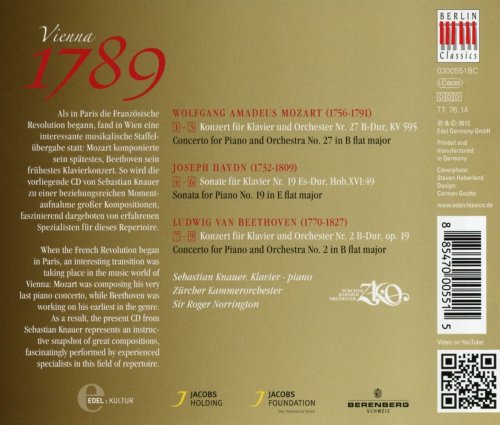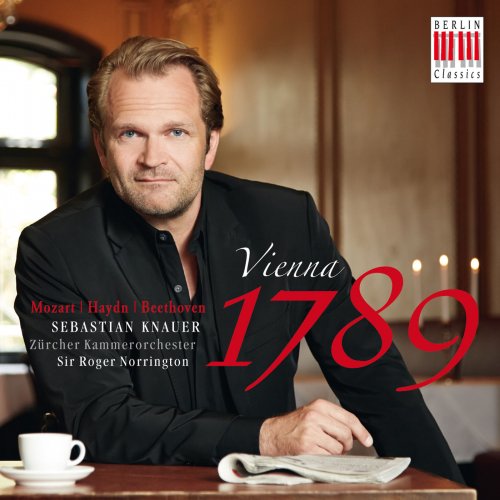
Sebastian Knauer, Zürcher Kammerorchester, Sir Roger Norrington - Vienna 1789 (2013)
BAND/ARTIST: Sebastian Knauer, Zürcher Kammerorchester, Sir Roger Norrington
- Title: Vienna 1789
- Year Of Release: 2013
- Label: Berlin Classics
- Genre: Classical
- Quality: flac lossless
- Total Time: 01:16:12
- Total Size: 252 mb
- WebSite: Album Preview
Tracklist
01. Piano Concerto No. 27 in B-Flat Major, K. 595 (Wolfgang Amadeus Mozart): I. Allegro
02. Piano Concerto No. 27 in B-Flat Major, K. 595 (Wolfgang Amadeus Mozart): II. Larghetto
03. Piano Concerto No. 27 in B-Flat Major, K. 595 (Wolfgang Amadeus Mozart): III. Rondo. Allegro
04. Keyboard Sonata in E-Flat Major, Hob. XVI:49 (Joseph Haydn): I. Allegro
05. Keyboard Sonata in E-Flat Major, Hob. XVI:49 (Joseph Haydn): II. Adagio e cantabile
06. Keyboard Sonata in E-Flat Major, Hob. XVI:49 (Joseph Haydn): III. Finale. Tempo di Minuet
07. Piano Concerto No. 2 in B-Flat Major, Op. 19 (Ludwig van Beethoven): I. Allegro con brio
08. Piano Concerto No. 2 in B-Flat Major, Op. 19 (Ludwig van Beethoven): II. Adagio
09. Piano Concerto No. 2 in B-Flat Major, Op. 19 (Ludwig van Beethoven): III. Rondo. Allegro molto

Vienna 1789? That was the year of Paris, the storming of the Bastille and the French Revolution. The Hamburg pianist Sebastian Knauer makes it clear on his new CD that there were things happening in Vienna that year too. The great Viennese Classical composers were busy writing music that shows how fast things were moving at that time. Wolfgang Amadeus Mozart composed his last Piano Concerto, K595, while his "successor" Ludwig van Beethoven was writing the first of his piano concertos, which we now know as his Second Piano Concerto, op. 19 – both in B flat major and both with interesting features to contrast and compare. It would be a mistake to look for the spirit of the Revolution in these works; that wind of change was not yet blowing through Europe. The ideas of the Enlightenment were already fermenting in people's minds, however. So it is no accident that this musical succession should involve two composers who illustrate in their careers the transition from the professional musicianship of Court lackeys to the amateur music‐making of the bourgeoisie.
01. Piano Concerto No. 27 in B-Flat Major, K. 595 (Wolfgang Amadeus Mozart): I. Allegro
02. Piano Concerto No. 27 in B-Flat Major, K. 595 (Wolfgang Amadeus Mozart): II. Larghetto
03. Piano Concerto No. 27 in B-Flat Major, K. 595 (Wolfgang Amadeus Mozart): III. Rondo. Allegro
04. Keyboard Sonata in E-Flat Major, Hob. XVI:49 (Joseph Haydn): I. Allegro
05. Keyboard Sonata in E-Flat Major, Hob. XVI:49 (Joseph Haydn): II. Adagio e cantabile
06. Keyboard Sonata in E-Flat Major, Hob. XVI:49 (Joseph Haydn): III. Finale. Tempo di Minuet
07. Piano Concerto No. 2 in B-Flat Major, Op. 19 (Ludwig van Beethoven): I. Allegro con brio
08. Piano Concerto No. 2 in B-Flat Major, Op. 19 (Ludwig van Beethoven): II. Adagio
09. Piano Concerto No. 2 in B-Flat Major, Op. 19 (Ludwig van Beethoven): III. Rondo. Allegro molto

Vienna 1789? That was the year of Paris, the storming of the Bastille and the French Revolution. The Hamburg pianist Sebastian Knauer makes it clear on his new CD that there were things happening in Vienna that year too. The great Viennese Classical composers were busy writing music that shows how fast things were moving at that time. Wolfgang Amadeus Mozart composed his last Piano Concerto, K595, while his "successor" Ludwig van Beethoven was writing the first of his piano concertos, which we now know as his Second Piano Concerto, op. 19 – both in B flat major and both with interesting features to contrast and compare. It would be a mistake to look for the spirit of the Revolution in these works; that wind of change was not yet blowing through Europe. The ideas of the Enlightenment were already fermenting in people's minds, however. So it is no accident that this musical succession should involve two composers who illustrate in their careers the transition from the professional musicianship of Court lackeys to the amateur music‐making of the bourgeoisie.
As a ISRA.CLOUD's PREMIUM member you will have the following benefits:
- Unlimited high speed downloads
- Download directly without waiting time
- Unlimited parallel downloads
- Support for download accelerators
- No advertising
- Resume broken downloads


